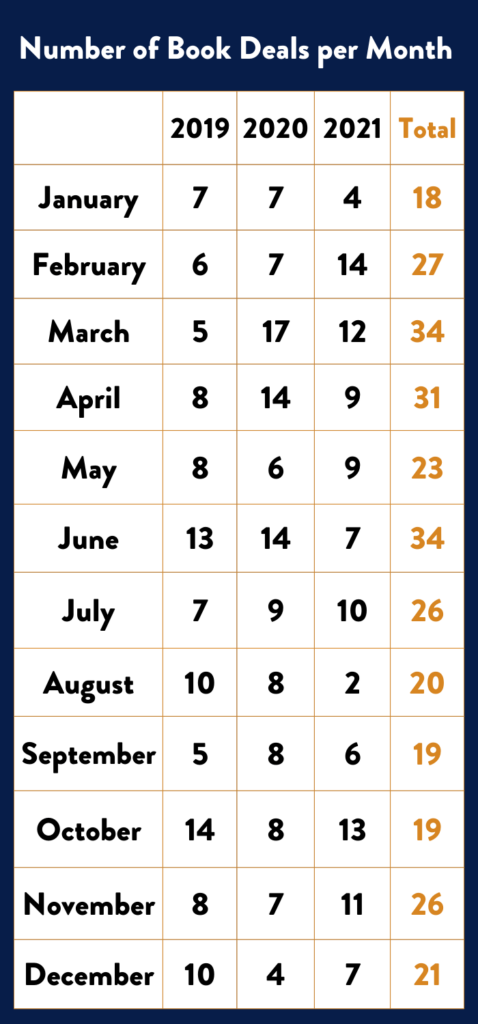
Guest post by Mark Gottlieb
So you are a hopeful writer looking to become a published author and your novel is getting rejected right and left, but maybe the problem isn’t the plot or characters or ideas. Maybe you’re just submitting at the wrong time.
Is there a wrong and right time to submit? Yes. Absolutely.
But how do you figure out the right time of the year to submit and avoid the wrong times?
It’s a mistake to rely on anecdotal evidence. For instance, in this Writer’s Digest article, titled “Funny You Should Ask: What Are the Best Times to Submit to a Literary Agent?” industry pros are asked their general opinions off the cuff. While it is a fun and informative article, it’s an opinion piece, rather than something driven by actual data.
What you should do is look at the data.
What I’m going to do in this article is give you data from:
- The Trident Media Group, where I’ve worked as a literary agent since 2012.
- Publishers Marketplace.
- Personal acceptance rates among Mark Gottlieb clients over the years.
- Yearly major conferences and book fairs occurring in a given month.
… so you can submit your manuscript at EXACTLY the right time.

Perceived Worst Times
- Summer (June, July, August).
- November and December.
The rumor is that June, July and August are seen as slower months in publishing because
- Summer Fridays are in full swing.
- Industry professionals take their summer vacations.
- Parents have their kids home from school during the summer.
Longstanding employees go on sabbatical.
The rumor about November and December is – well, maybe you’ve heard there are some holidays happening around this time? Agents aren’t scooping up new acquisitions; they’re eating turkey and going to parties and buying presents for their families. Publishers are also believed to be far out from when their budgets began for the year in January.
The industry-wide speculation is that, while literary agents aren’t selling books to as many editors at publishing houses in August and December months—they are using those months to catch up on their submissions that have been clogging their inboxes until that point. While I think it is a mistake to ever close oneself off to the opportunity of query letters or submissions, some literary agents have been known to do so, especially in the months of August and December.

Perceived Best Times
Based on hearsay, the best time for submissions are:
- Beginning of the year (January, February, March, April, May).
- Fall (September, October).
Why? There are two major falsehoods that make writers believe these are the best times:
- Agents and editors are fully back at their desks, and not on vacation.
- Publishers only budget for new projects at the start of the year and autumn.
To figure out the REAL best time to submit to agents and publishers, let’s look at the data.
Hard Data for Book Deals With Trident Media Group, including Mark Gottlieb Deals

So based on the data above, what are the worst and best times to submit to literary agencies?
Actual Worst Times
January.
It’s the lowest month out of the year in total number of deals. Literary agents and book editors are slow to get back to their desks from the holidays in the start of January.
It’s like a hangover from the holidays.
Plus, agents are deluged with manuscripts with submission-happy authors fulfilling New Year’s resolutions, so you’ll get lost in the shuffle.
August, September, October
Agents are swamped in September and October. After being gone on vacation in August, Publishers get back to their desks and are distracted and overwhelmed. Literary agents have been holding onto projects until September, creating a logjam of submissions.
Everyone is simply too busy to look at new submissions.
As for August, agents and editors vacation that month, so that means they’re all out of the office.
And October is taken up by the Frankfurt Book Fair, which is in Germany. It’s five days long, and if you add in travel days, plus travel preparations and recovery from exhaustion afterwards, it takes a huge chunk out of the month.
December
This month saw a relatively low volume of deals. December is the peak holiday month and the most competitive time of year for books to publish in for the gift-giving season. Many agents and publishers are trying to clear their desks later in the year in time for the holidays. Depending on the publisher, many budgets are depleted in December and are expected to reset in January.

Actual Best Times
March, April
Over any month, March saw the highest volume of book deals.
Surprisingly, the second largest international book fair—the London Book Fair, which occurs in March, had no impact on March being one of the best months. While literary agencies hold off on submissions during the London Book Fair in March, it creates openings for submissions to editors.
April is the second highest volume of book deals in a month, after March and June. April is the start of a new financial quarter, which means they have $$$ to buy books, and precedes the business of Spring Sales Conferences for some publishers, which means they are hungry for new books.
June
This month tied with March for highest volume of deals.
Literary agents begin to hold off on submissions in this month in anticipation of the summer doldrums of book publishing, which creates an opening for submissions to editors at publishing houses.
Also, “Summer Fridays” begin in this month and continue in July and August, allowing for more reading time. To account for the Summer Fridays, publishers ask their staff to stay an extra hour at work four days of the week before each Friday of the summer months. Not only do publishers suddenly have more reading time afforded to them on Fridays—they will also have been available at their desks for an extra hour each day during the prior four work days.

FAQ
1. What if I submit during the off months? Is it hopeless?
The answer is NO. Books are being bought and sold through every month of the year. The worst month is still seeing deals at roughly 55% of the rate of the highest month.
2. Is there a delay between submissions and book deals?
Books are not always submitted to publishers precisely when they are brought on by agents for representation. Although on occasion they are. In general, though, these are the best times to get a book deal.
3. If others catch on, won’t the best times become the worst times?
Publishing is stubbornly slow-moving and full of dinosaurs. If publishing was the tech industry, the data would have spurred agents and editors onward long ago. There’s plenty of time to take advantage of this strategy and make it work for a long while.
4. I can only control when I can submit to literary agents. How do I control when my literary agent submits to publishers?
Literary agents have what’s called a “fiduciary responsibility” to their clients. That’s a fancy way of saying, whatever you say to your agent, goes. Literary agents are obligated to listen to and obey the needs and requests of their clients.
5. What if I choose to simply ignore the date and just follow my intuition?
There’s really no wrong answer when it comes to following one’s own gut instincts. For instance, after comic book-style illustrated cookbooks became a popular trend, I decided with a client of mine that we should rush to submissions to avoid what has later become a crowded marketplace.
6. Apart from deciding when to approach literary agents and book publishers, when should I think about approaching freelance editors?
Compared to the innerworkings of traditional publishing, freelance editors think far less seasonally, since they do not want for their projects to become much too occasional. Freelance editors would much rather hear from potential clients around the clock.
7. What do I do if I my literary agent and I submit to book publishers during one of the best months, but we receive some passes or requests to revise and resubmit? In our next round of submissions, do we have to wait until another ideal month comes along?
Failure can sometimes be viewed as an opportunity and with how book publishing moves at the pace of an oil tanker, it can be good to take some time to regroup and plan the next move. With that being said, sometimes, depending on timing, there is enough time to do a quick turnaround to submit within the same ideal month.
8. Aren’t literary agents and editors at publishing houses going to be mad if I submit my work to them during a less ideal time, such as a holiday season or during busier months?
Authors are the lifeblood of book publishing. If a literary agent or editor at a publishing house is too “holier than thou” to accept a submission during whatever is perceived to be one of the worst months, then it might actually be worth thinking twice about working with them.
AUTHOR BIO:
Mark Gottlieb is a literary agent in New York City at Trident Media Group, book publishing’s leading literary agency. While at Trident Media Group, Mark Gottlieb has represented numerous New York Times bestselling and award-winning authors.



6 comments
Who did the math on this chart? I get 35 for November, NOT 19.
I think you mean October, not November, but you are right!
How are you supposed to be able to submit to agents in the “worst months” or holidays when every agent seems to take holidays off and says anything submitted to their agency during that time *will* be deleted?
Every agency I checked on querytracker and on their website seemed to be closed to queries this summer. So I’m confused by that bit at the end of the post.
Thank you for any clarity you can bring me. (Or corrections to my misunderstanding)😅
Very interesting article that goes well beyond just the publishing world as this analysis can often fit Western society in general. I’m conveniently finishing the edit to my first book just in time to start attempting to submit by the looks of it.
I sent a query in August of 2022 and received an automatic closed for submissions reply and then received a request for my manuscript two days later. SO write the best book that’s inside you and submit when you’re ready. Sadly nothing came of the request but it taught me not to shut down regardless of the month or the generated response.
In reading through this I figure that it’s probably also a good idea to figure in an agent’s average response time into your submission. Most agents seem to average around 3 months as far as I can tell from places like Query Tracker. So who knows, maybe December is a fantastic time to query an agent?